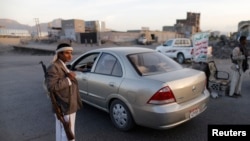With Shi’ite rebels now firmly in control of much of Yemen’s capital, analysts say a lasting peace in the fractured nation may never come.
Shiite tribesmen known as Houthis overran Sana’a in September and took over major buildings and government agencies. A hastily-brokered United Nations agreement has attempted to implement a truce.
In exchange for a ceasefire, the agreement calls for a new prime minister, a new cabinet, reinstatement of fuel subsidies, and the appointing of political advisors from the Houthis and southern secessionists.
Yemen has named a prime minister in recent days, Ahmed Awad Mubarak. He recently headed the National Dialogue Conference between the Sana'a government and the Houthi rebels.
Analysts say this is the first step to implement a power sharing agreement that Houthis have forced upon the country. But they concede it may not work.
Houthis, analysts say, aspire to what many Yemenis hoped would happen when they overthrew their longtime dictator Ali Abdullah Saleh. They hope to capitalize on popular demands to address rising energy prices, economic distress, and the poor performance of Yemen’s transitional government.
Sheila Carapico, a professor of political science at the University of Richmond and a scholar at the American Institute for Yemeni Studies, said that the Houthis succeed by appearing to be more appealing to the young masses.
“Their demands are more persuasive than most of the other major actors in Yemen and they were able to capture some of the sentiments of the youth movement calling for a real change in the country.” Carapico said.
But David Newton, former U.S. Ambassador to Yemen interpreted the agreement as a sign of a further weakening of the government.
“The agreement is giving the Houthis a great deal of leverage and there is a lot of temptation to use it, this also appears to have split the army while there is a risk of the government is further weakened.” Newton said. “What we want to avoid is government collapse which would mean chaos which would impact our efforts to control al- Qaeda in Yemen.”
Sunni-Shi’ite factor
U.S. President Barack Obama has said that the Sunni-Shia tension must be dealt with to avert conflicts in the Middle East.
Newton said that has limited applications in Yemen.
“Until the unification of Yemen, the Zaidi Shi’ites controlled the country,” he said. “But after removing their Imam from power in 1962, consecutive governments neglected their community and the rising Sunni fundamentalism backed by Saudi Arabia was directly threatening their very existence.”
Newton said that this tension produced a more militant generation that took arms under the Houthi umbrella. And it drew in Saudi Arabia and Iran, he said.
“Saudi Arabia has traditionally been the main driver in promoting Sunni fundamentalism in Yemen,” he said. “And while Houthis are a very separate form of Shia Islam, not related to the form in Iran, Tehran tried to have some influence in Yemen.”
But Danya Greenfield, deputy director of Rafik Hariri Center for the Middle East, said while there is no doubt as to Saudi and Iranian involvement in Yemen, it is wrong to draw conclusions.
“It would be misleading if we pictured the conflict in Yemen as a sectarian strife,” Greenfield said. “It is a conflict over political power and authority.”
Analyst Newton agrees.
“Yemen has had a weak central government and the authority of the government was never very great, but the biggest factor is growing poverty, discontent unemployment fueled by the highest population growth in the region,” he said.
Newton is concerned that instead of using dialogue to solve Yemen’s problems, guns have become the ultimate source of power.
And using force in shifting the political balance threatens the future of Yemen, Greenfield said.
“I worry about the long-term cost of Houthis’ affirming the validity of using weapons to assert political aspirations,” she said.
Greenfield said if Houthis continue their refusal to withdraw from the capital, it could lead Yemen to more instability.
“If the Houthis do not actually implement their part of the agreement we are going to see prolonged period of tension and potential confrontations as well as more erosion of the Yemeni president credibility a s a leader of the country.” Greenfield said.
Next moves
With the Houthis taking over the headquarters of the defense ministry, the government TV station and the central bank, many Yemenis worry about the Houthis political and territorial ambitions.
Analyst Carapico remains optimistic, though, about the ability of rivals in Yemen to dialogue. However she is concerned about resorting to arms to settle the conflict.
“Unfortunately the most influence in today’s Yemen seems to come from who has the most weapons rather than the most convincing argument or the voices of reason,”Carapico said.
But for Greenfield what happens next in Yemen will rest largely on whether the next prime minister can demonstrate leadership and if the Houthis want to be a part of the political process.
The immediate concern for the U.S. in Yemen is combating the Yemen presence of al-Qaida in the Arabian Peninsula.
Newton believes it is the time for the U.S. to mobilize the international community to help Yemen.
“What we can do is to try to round up other countries to support the government and provide disparately needed financial aid and support badly needed reforms in Yemen,” he said.
But analysts say that with a weak and fractured government, Yemen’s future is clouded with a lot of uncertainty.
“The situation in Yemen is too fluid, too evolving to predict where it is heading.” Greenfield said. “Yemenis have had the capacity to pull back the most violent factions from the brink of civil war, but it is very worrisome to see the possibility of prolonged confrontations coming back again.”




